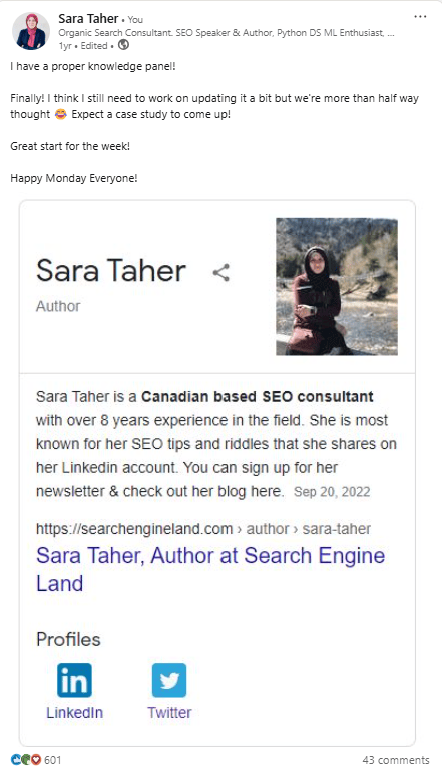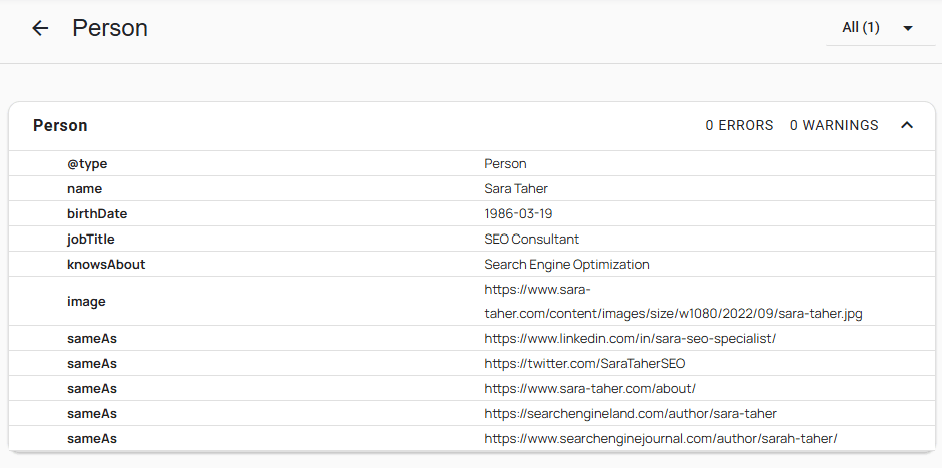How I Got a Knowledge Panel and Lost It
More than a year ago, I put in sometime to get my very own knowledge panel in Google, and guess what? With some effort and strategy—it worked! Here’s how I achieved it, what I learned, and why I lost it.
This is my knowledge panel
What is a knowledge panel?
Knowledge Panel appears on Google's right-hand side during searches for entities, offering a quick summary based on Google's understanding. It acts as your Google resume.
I talked about it with Jason Barnard, watch us here discussing my knowledge panel:
So How did I get my knowledge panel?
Built a website and an about page. It doesn't have to be elaborate but I made sure it lists my work and up-to-date information about myself.
I added the Person Schema to my about page. Person Schema is a way to give search engines structured data about you. Think of it as a roadmap to your online identity. This included links to all my social profiles, and author profiles as well on industry publications like Search Engine Land and Search Engine Journal.
I made sure that relevant, authoritative sources confirm the facts about me that I'm sharing on my website.
💡 Google thrives on repetition when it comes to Knowledge Panels since repetition builds up confidence. - Source
So I went to every profile page and article about me and made sure that information listed is up-to-date and aligns with the information on my website.
Some experts suggest you may need at least 30 reliable and relevant sources. So I went ahead and created a spreadsheet of all my name mentions, and reached out sometimes to websites to get my data updated and linking back to my website, if that's not something I can change myself.
💡 Pro tip: Keep a spreadsheet to track your online profiles, mentions, and links.
and that's it! Does that mean it's a simple process?
Is it easy to get a knowledge panel?
You have to put in the work to get a knowledge panel. Some of the things you need to do:
Have a good online presence and activity on social platforms.
Contribute to top industry publications.
Take part in webinars and podcasts.
All these things will contribute in building your online brand, presence and support your knowledge panel.
How did I lose my knowledge panel?
As simple as this may sound, I lost it because some of the information about me online is outdated or not accurate. This shows that you need to maintain a knowledge panel, at least when you just got it!
💡 This just goes on to show, that SEO is not a one and done thing!
So, I created this checklist to work on recovering my knowledge panel. It can also be helpful if you're considering doing an audit for a knowledge panel for a client.
Step 1: Verify Your Information:
Check if your website's "About" page is up-to-date and contains accurate details.
Ensure all social media profiles and author bios align with your website’s information.
Step 2: Review Person Schema Markup:
Use tools like the Structured Data Testing Tool to verify that your Person Schema is implemented correctly.
Include updated links to your social media profiles, publications, and other authoritative sources.
Step 3: Search for Mentions of Your Name:
Conduct a Google search for your name and review all indexed mentions.
Look for outdated or inconsistent information and make updates where needed.
Check industry websites and publications to ensure they list accurate details about you.
Step 4: Social Media Activity and Missing Content
Stay active and consistent on key platforms to maintain visibility.
Identify if there are missing or underrepresented aspects of your work online.
Publish new content or participate in podcasts, webinars, or interviews to fill these gaps.
Step 5: Track Your Efforts:
Keep a spreadsheet to record updates, new mentions, and links to track your progress. Remember maintenance is part of the task.
I guess it's not time for me to start doing an audit and find areas for improvement! Wish me luck!



